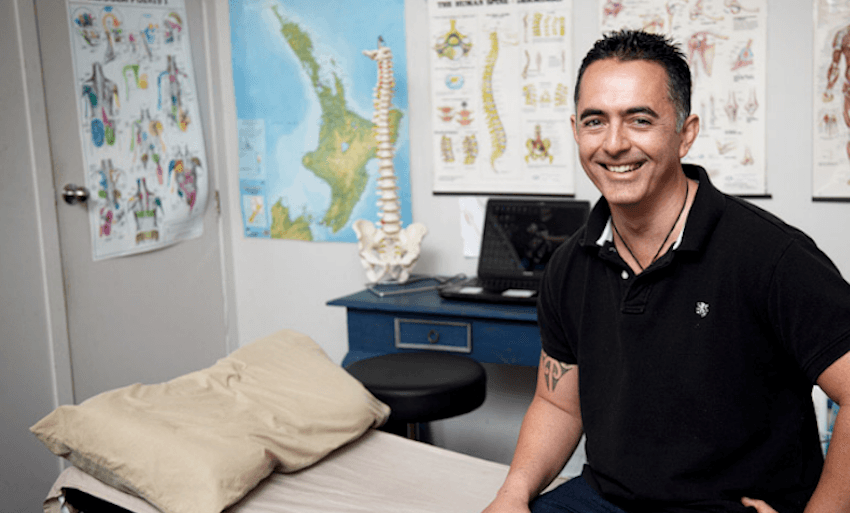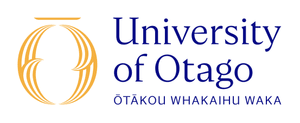Physiotherapist Ricky Bell pursued groundbreaking research into holistic approaches to obesity and Māori because that’s what his community needed… even if it meant his reputation as a fisherman had to suffer.
Ngāti Hine rangatira Te Ruki Kawiti initially refused to sign Te Tiriti o Waitangi, believing it would lead to further loss of land for Māori. He eventually yielded to pressure and signed in May 1840 but as symbol of rebellion, he placed his mark at the top of the page above the names of the chiefs that had already signed.
Thirteen generations later, his descendent, physiotherapist and recent University of Otago PhD graduate Dr. Ricky Bell (Ngāti Hine, Ngāpuhi, Ngāti Hau, Te Rarawa, Te Aupōuri), is still questioning things.
“Many aspects of healthcare in New Zealand, in terms of the way it’s delivered, are breaching the Treaty. There’s no partnership in our health delivery and that’s what article one is all about – partnership.”
Our ancestor Te Ruki Kawiti did not sign Te Tiriti O Waitangi on #WaitangiDay day 178 years ago. He reluctantly agreed to do so at a special meeting with Hobson, in May 1840, and his name appears above the other signatures of 6 February. #TangataWhenua #Rangatiratanga pic.twitter.com/U44Tca30Oa
— Ricky Bell (@BellRickyNZ) February 5, 2018
A Mozzie by way of his Te Tai Tokerau mother and Australian father, Bell crossed the ditch at the age of seven, living on the Gold Coast and then settling in Cairns where he grew up fishing and diving on the reef. The family returned home regularly to Northland for tangihanga, weddings and Christmas.
He describes his upbringing as privileged. “We weren’t too keen on coming home as kids ‘cos it always meant mahi for us. We didn’t have that in Aussie,” he says laughing from his clinic in Cooper’s Beach in the Far North.
After gaining his bachelor of physiotherapy at the University of Queensland in the mid-90s, Bell set up a sports and spinal practice, working with sports teams such as the Brisbane Bullets basketball team and the Brisbane Broncos rugby league football club.
He toured as the team physiotherapist for the Queensland Under 19 women’s netball team for six years. And then in 2006, he and his wife decided it was time to come home to Aotearoa so their tamariki could better connect with their whānau.
He moved home for good in the winter of 2008, and set up a clinic on the shore at Te Oneroa-a-Tōhē in Ahipara.
“We had a clinic there for about eight years. Then we set up a koha physio clinic with Dr. Lance O’Sullivan and his clinic at Kaitaia hospital. We still run that.
“When Air New Zealand stopped flying into Kaitaia, April 28 2015, it was too far to travel to Kerikeri airport, so we had to move to the east coast, so we now live in Cable Bay.”
He’d always been a high achiever, and eventually there was talk among his whānau and kaumātua about Bell furthering his studies. He says that he was politely told, not asked, to go and do his Masters degree.
“My aunties, uncles and kaumātua up here, they had me lined up to do this type of thing a long time ago. One of my kaumatua, he says ‘You’re going and doing that!’
“I got tautoko in the way of scholarships and things like that. And once I was in it, once that waka started, I started to like it.”
Bell says he enjoyed the research and meeting other Māori health practitioners “on the same buzz.”
“I just started with a post graduate diploma at Otago, and then went on to do a Masters in Manipulative Physiotherapy looking at the injury profile of waka ama. I really enjoyed that.”
After obtaining his Masters in Manipulative Physiotherapy, Bell attended his first hui to present his findings. “It was Hui Whakapiripiri in 2012, and I thought ‘how cool is this?’ Heaps of people that are like me.”
At that hui Bell met Dr. Geoffrey Kira, his whanaunga from Northland and a lecturer at the school of sport and exercise at Massey University.
“From there, he became my tuakana. And he was encouraging me from the start to push on to do my PhD. I was only just finished my Masters!”
Bell took a year and a half to recharge, and catch up on his beloved pastimes of diving and fishing. And then with the encouragement of his mentor and his whānau, he headed down the PhD track.
He’s candid about the challenges of such a commitment. “As any PhD student will tell you, it’s highs and lows. It’s hard for tangata whenua to go on that hīkoi. It demands of you to isolate yourself, because if you can’t isolate yourself you can’t write. It takes you away from whānau.”
When he was done, he became the first Maori student to gain a PhD in physiotherapy from the University of Otago.
“When I finally finished it was one of the best days ever.”
The real measure of Bell’s isolation was the state of his freezer. “The sad thing was the cuzzies stopped coming round for catch ups. They’d always come round and ask ‘cuzzy have you got something in the freezer for us?’ But for the last six months of writing up my thesis there was only two mullet. And those two mullet had been in there for a year already. Normally it’s half full of pāua, koura, the rest of it. I felt stink about that.”
But he’s hoping the trade off was worth it. As it turned out, the subject for his doctoral research came from his own community. It was during wānanga with hapū and iwi that his research came into focus, but also shone a light on some of the incompatibilities of tikanga Māori and Western knowledge seeking practises.
“If you know your tikanga, when you go onto a marae the kaupapa of the hui, and the outcome, is not determined beforehand. The whare tūpuna determines the outcome of that kaupapa. Yet when you’re researching, and you’re asking for approval for that research, everything has to be lined up, your ducks in a row, before you can go and do anything. Then you take it out for consultation after everything’s set. So when some universities go through rangahau with tangata whenua, it’s often just a box ticking exercise.
“That’s just not how Māoridom works. You have an open forum and you wānanga about whatever your kaupapa is and that determines where you go. We flipped that and made sure that tangata whenua had the power, had the mana. They’re weren’t just passengers, they were driving.
“We didn’t even know that obesity was what our research area was going to be, but that’s what hapū whānau up here wanted us to do. And so we built from that.”
Statistics show that almost 50% of all Māori adults are considered obese, yet until now there has been no research exploring the Māori or indigenous context. The resulting research, Huarahi Hauora – Identifying a pathway forward to wellness for Māori, is a fascinating look at the drivers of obesity among Māori.
Bell talks about the biomedical model within primary healthcare that simply pushes diet and exercise as a way of managing obesity. He describes it as reductionist in its approach, and explains that it’s a model that just doesn’t work for Māori.
He talks about the experiences of some of the 15 participants from the Kaitaia region that contributed to the final analysis.
“When a client goes to their doctor and the doctor says ‘You’re a bit heavy. You need to eat better and exercise more’ – only one of the participants had an understanding of that approach, but everyone else, it didn’t connect to them. It was in one taringa and out the other one.
“One participant said that when she goes to the doctor, the first thing he says to her is ‘Hop on the scales’. There’s no whakawhanaungatanga or asking what’s going on her world. It’s all about the number. This is your number; this is your BMI. That’s non-relatable, yet it’s still the driving message that exists in our public healthcare spaces.
“So, if that’s the primary public health message being pushed, it’s setting up our whānau to fail.”
A huge factor is the impact of colonisation. The effects on the collective psyche of Māori might seem obvious, but its impact on health is in fact underpinned by medical science.
“Historical trauma can manifest itself in pain,” Bell explains. “The science is around epigenetics – which refers to how our genes function. You’ve got your core structure, which is your DNA and epigenetics is how your genes interact with each other.”
Simply, epigenetics is the study of biological mechanisms that will switch genes on and off. And research suggests that the negative effects of trauma can be inherited.
“Domestic violence, child abuse, sexual abuse, anything like that, it can manifest many generations later. There’s lots of papers on historical trauma, particularly from Inuit whānau and Indigenous North American whānau. I heard an elder in Australia speak about how there needs to be seven generations of wellness to heal one generation of trauma.”
He says the very real pain of inherited trauma effects the body in a number of ways.
“There’s a thing called homeostasis, which is your body’s attempt to reach equilibrium. If your body is high in glucose for example, it will try to regulate that, dampen it down. If you’re low in something else, it will try and elevate it. It’s always trying to reach a steady level. Pain can disrupt the way your body achieves homeostasis. Isolation, loneliness, separation can also manifest itself in negative ways on your body’s ability to maintain homeostasis. So you can see those effects of colonisation too, through urbanisation, disconnection to our culture and our whānau and way of life.”
The findings of Bell’s research, happily, include ways forward for whānau to achieve wellness.
“Every time [the participants] engaged in a cultural activity they felt well. That enabled them to cope with things a lot better in terms of their resiliency. Also things like kotahitanga and doing things collectively was a strong voice to come out of the research. If you look at things like Iron Māori, look how successful that is. When those tickets go on sale, they’re sold out in five minutes. Whānau like it because they’re doing it with others, they’re doing it as a hapū, as a whānau. It’s about participation, awhi, manaakitanga, kotahitanga – all the things that we relate to, that make us feel good and enable us to be successful in those types of activities.”
He hopes that more healthcare practitioners will move away from the ‘personal responsibility’ narrative and the biomedical model, and frame the message in terms of relationships.
“If we can get our doctors and anyone that’s involved in the healthcare space to really think about the kupu that they’re using, and use the platform of togetherness, group activity and better interaction with your whānau as a driver.
“We want the public health approach to be strength-based, that it’s a collective approach to health and wellness and the message is that you’re going to have a better lived experience with your whānau. And none of the public health messages currently are anything like that.”
“We wanted to add a Māori voice to what obesity means to tangata whenua here in Te Tai Tokerau. We can go lots of places with this, that narrative is out there now in mainstream journals that the kāwanatanga can pick up and acknowledge and dig into further.”
For now Bell is happy for his research to be out in the world while he takes time to reconnect with whānau.
“I’m recharging at the moment, spending time with the babies, catching up with whānau.”
And hopefully for them, that means replenishing his neglected freezer.


